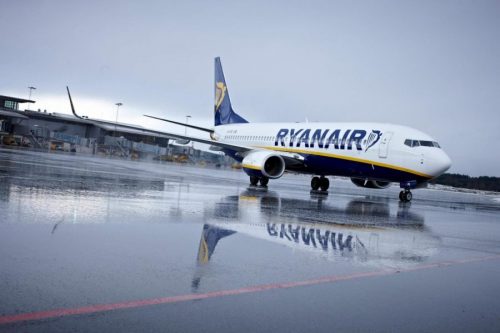Budget carrier revises redundancy levels after agreeing new working practices

No-frills airline Ryanair said it has scaled back a redundancy exercise announced in May after most cabin crew and pilots agreed to wage cuts and new working practices.
The carrier, which operated 80 routes out of its bases at Manchester Airport (46 routes) and Liverpool John Lennon Airport (34) prior to the pandemic, announced plans on May 1 to axe 3,000 jobs.
Ryanair employs 9,095 cabin crew and 5,446 pilots, while administrative jobs make up 992 of the payroll, and there are 704 in ground operations, 426 in maintenance, and 177 management.
It said it needed to make the staff cuts due to the parlous state of the industry following the closure of borders and grounding of airline fleets after the introduction of lockdown measures, which is expected to affect the travel sector for the next two years.
However, the Dublin-based airline has now revised its plans after 97% of pilots and more than 90% of cabin crew agreed to pay cuts and work practice changes.
Ryanair’s director of operations, Neal McMahon, said: “We haven’t finalised the number yet, we originally said there was going to be 3,000 redundancies, but we have been able to reduce that significantly.
“Broadly speaking they (pilots and cabin crew) recognise the grim situation we are in and they have been pragmatic.”
Mr McMahon and fellow director Darrell Hughes said the level of redundancies would now depend on Winter bookings and how much the pandemic disrupts travel next year.
Mr Hughes said: “Airlines have, for a long time, relied on business traffic, visiting friends and relatives and maybe an older non-family market for travel in September, October, November.
“It’s a big question as to what that level of demand is going to be, but it’s not looking good at present.”
The picture for the industry is continually changing, as countries are either added to, or removed from the UK Government’s list of destinations requiring travellers to self-isolate for two weeks on their return to the UK, depending on coronavirus infection levels around the world.
Only last week, Croatia, Austria and Trinidad and Tobago were added to the list of countries requiring self-isolation due to rising infection rates there.
On Friday, Manchester Airport announced it will close its Terminal Two building indefinitely, from September 2, due to the fall in passenger traffic as people shun foreign travel due to potential quarantine problems.








